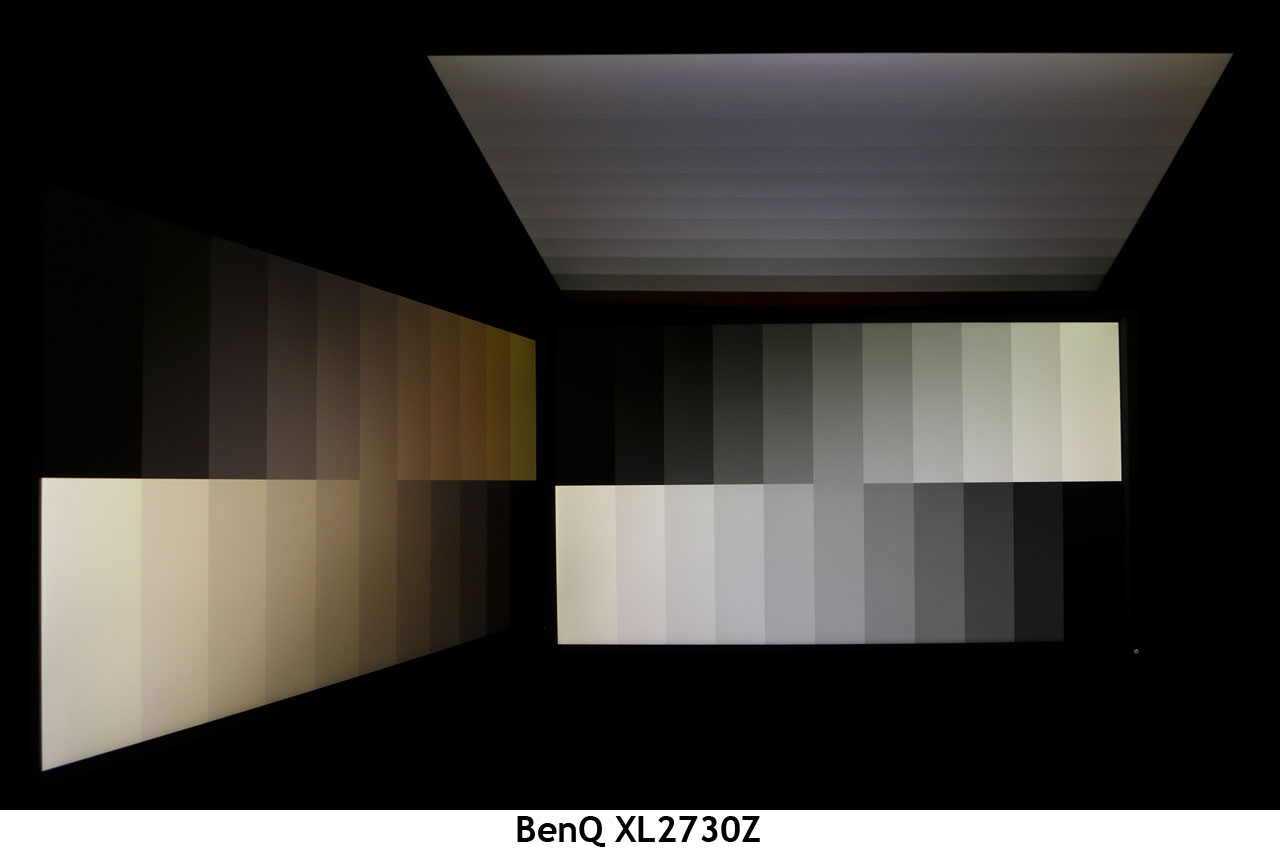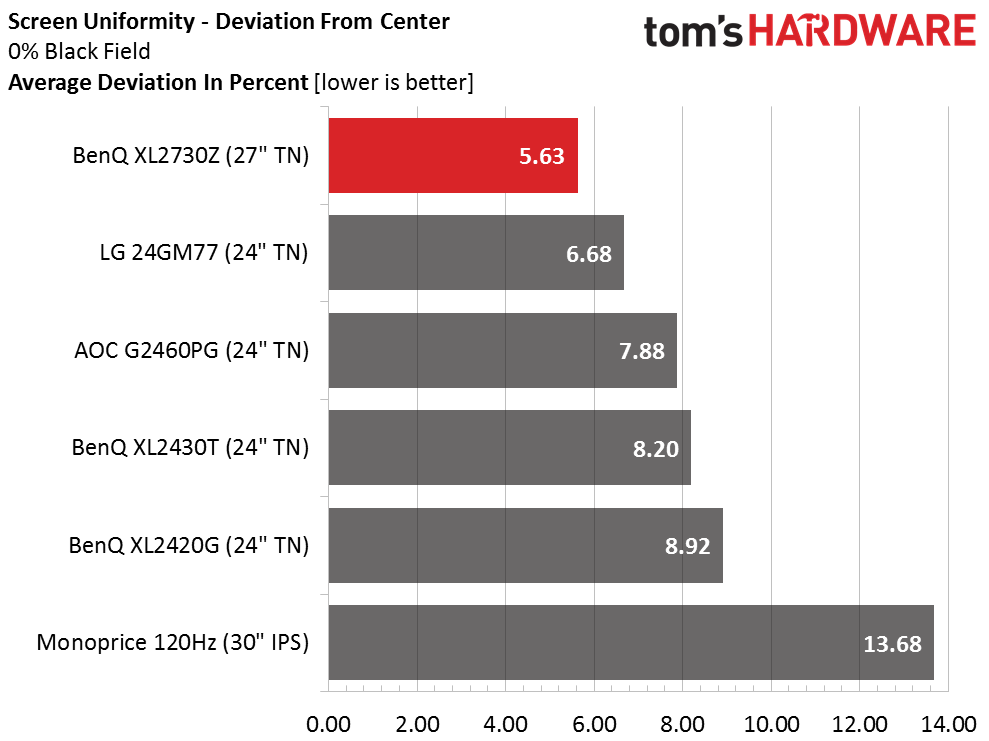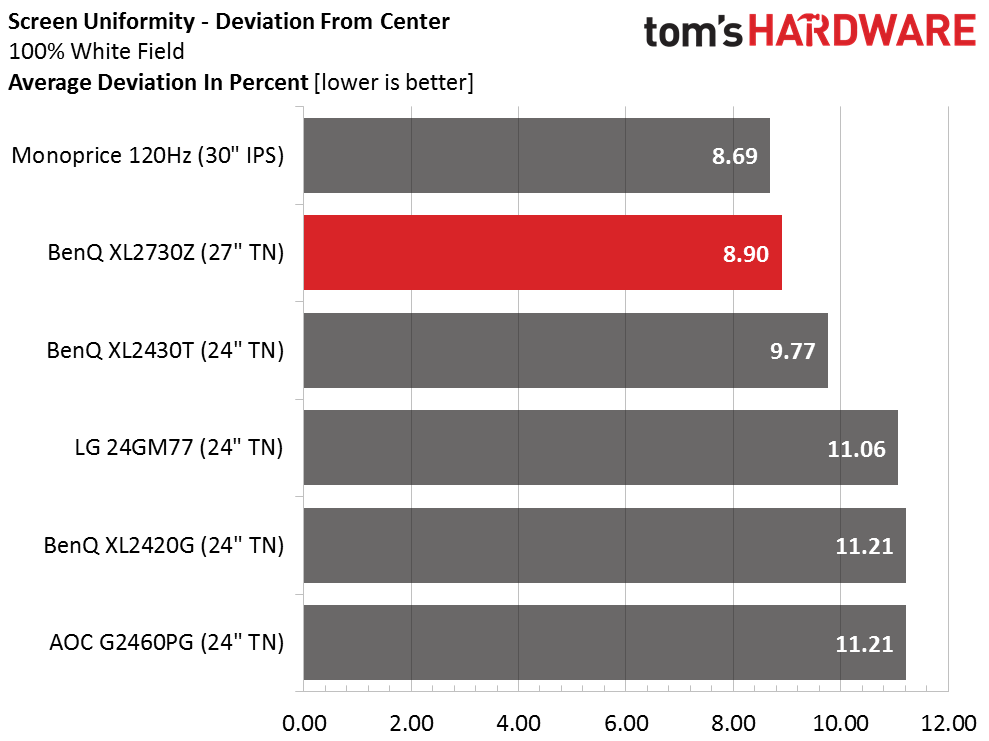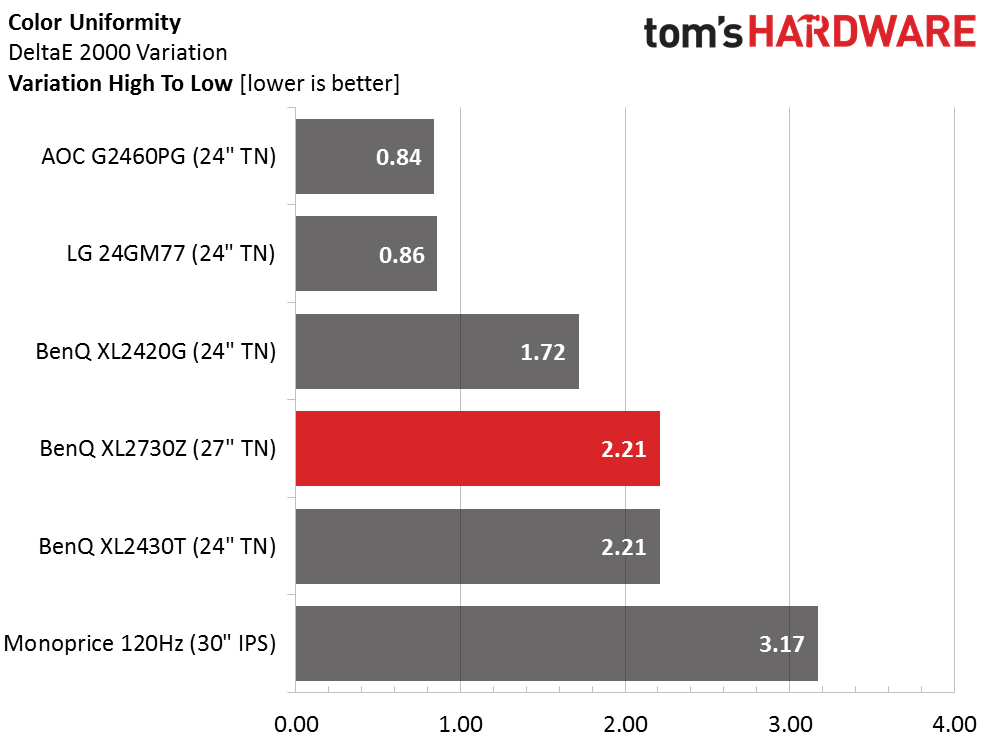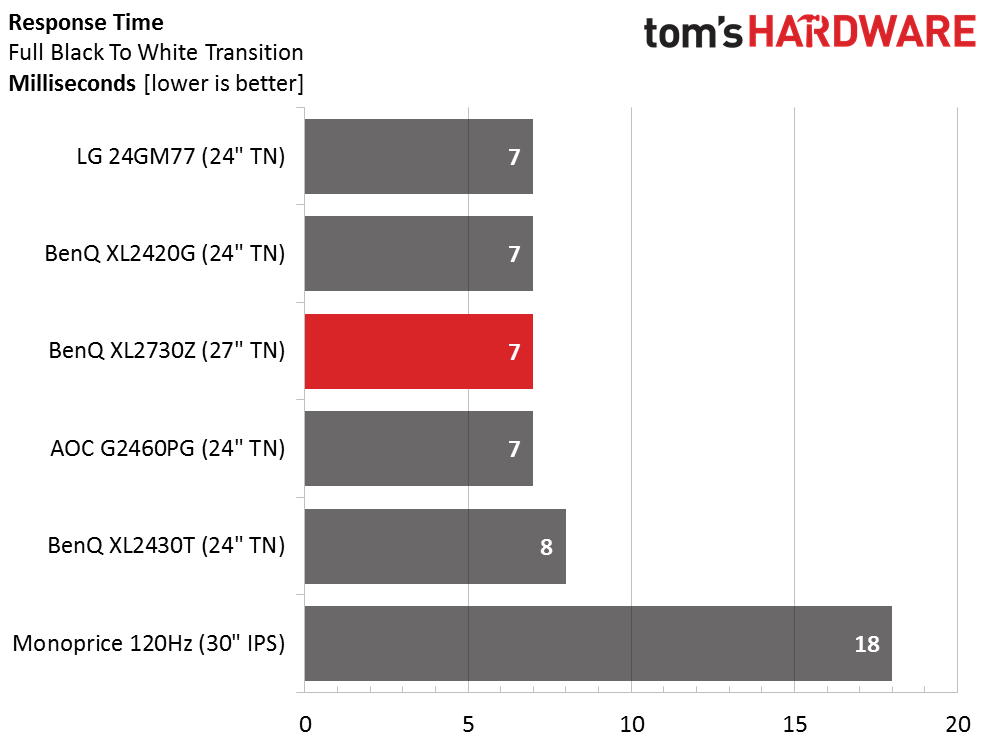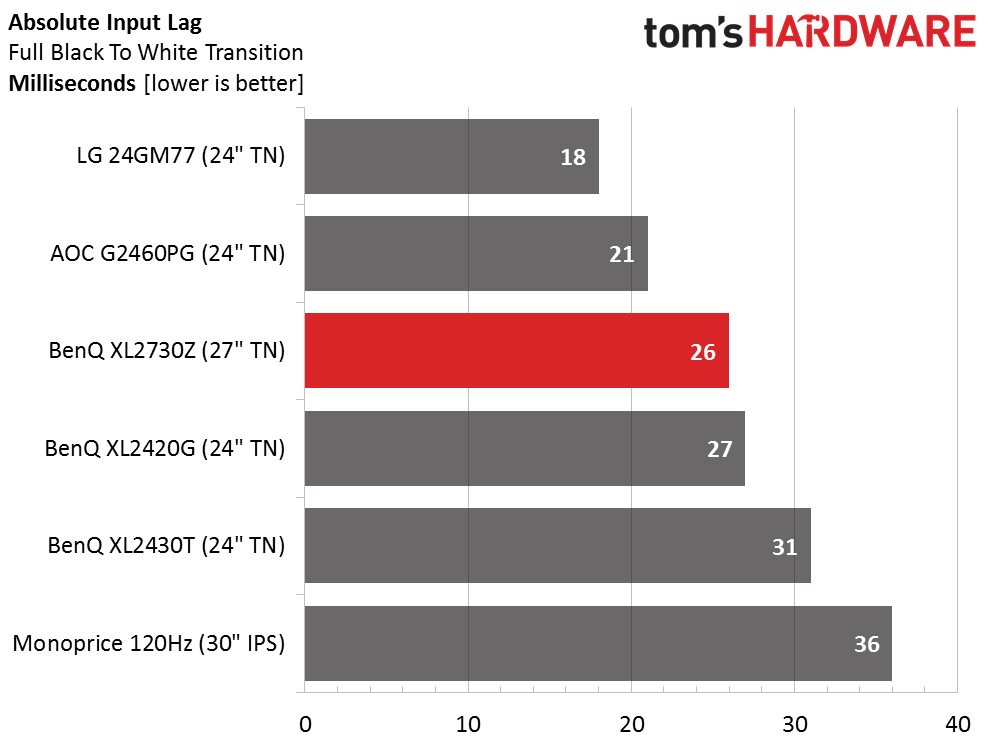BenQ XL2730Z 27-inch FreeSync Monitor Review
For our first chance to examine AMD’s FreeSync, BenQ sent us its brand-new XL2730Z, and we’re running it through our demanding suite.
Why you can trust Tom's Hardware
Viewing Angles, Uniformity, Response And Lag
To learn how we measure screen uniformity, please click here.
This is a fairly typical TN panel result except the side-to-side light falloff isn’t quite as severe as usual. You can see the red/green shift plainly but you don’t lose nearly as much detail or brightness as most other TN-based gaming screens. The top-down view shows that vertical angle is the more important setting to get right. Move to far above or below center and you lose detail and brightness.
Screen Uniformity: Luminance
During the ANSI contrast test, we remarked on the XL2730Z’s high-quality panel. The black field uniformity result confirms that observation. For all intents and purposes, this result is perfect. There is zero light-bleed from our press sample.
Here’s the white field measurement:
The white field result is equally superb. Edge-to-edge brightness is perfectly uniform to the naked eye. Our data shows a slight hotspot at screen center, but that can only be seen by our C6 meter.
Screen Uniformity: Color
The XL2730Z ties with its stablemate XL2430T in the color uniformity test. Again, we can’t see any problems, but our instruments show a slight green shift in the top-center zone.
Pixel Response & Input Lag
Please click here to read up on our pixel response and input lag testing procedures.
Get Tom's Hardware's best news and in-depth reviews, straight to your inbox.
We’re seeing consistent response times of seven or eight milliseconds from all of the TN-based gaming monitors we test. Even without motion blur-reduction, there is very little resolution loss in even the fastest-moving on-screen objects. Of course, since the XL2730Z has the best blur-reduction we’ve seen, we recommend using it all of the time.
Here are the lag results:
The LG 24GM77 is our current record-holder for low input lag. Fortunately, other screens (the XL2730Z included) aren’t too far behind. A difference of eight milliseconds is imperceptible and certainly won’t affect the gameplay of even the most competitive enthusiasts. A refresh of 144Hz is the way to go if response is important to you.
FreeSync
As with G-Sync, there is no point of comparison between monitors – it either works or it doesn’t. Once we installed the correct drivers in our test system, enabling FreeSync in the Catalyst software produced perfectly fluid motion in Watch Dogs and other games we tried. No matter how quickly you move the mouse, there is no tearing whatsoever.
Current page: Viewing Angles, Uniformity, Response And Lag
Prev Page Color Gamut And Performance Next Page QHD, FreeSync And More
Christian Eberle is a Contributing Editor for Tom's Hardware US. He's a veteran reviewer of A/V equipment, specializing in monitors. Christian began his obsession with tech when he built his first PC in 1991, a 286 running DOS 3.0 at a blazing 12MHz. In 2006, he undertook training from the Imaging Science Foundation in video calibration and testing and thus started a passion for precise imaging that persists to this day. He is also a professional musician with a degree from the New England Conservatory as a classical bassoonist which he used to good effect as a performer with the West Point Army Band from 1987 to 2013. He enjoys watching movies and listening to high-end audio in his custom-built home theater and can be seen riding trails near his home on a race-ready ICE VTX recumbent trike. Christian enjoys the endless summer in Florida where he lives with his wife and Chihuahua and plays with orchestras around the state.
-
norseman4 I don't understand why the price is so high. The only things I see that are different (in any meaningful way) from the Acer XG270HU (which I have, and am a fan of) is hight adjustment and an external puck to load configurable screen settings. (that is pretty cool though)Reply
The Acer also doesn't have the raised bezel that is actually about 8mm (Top, Left and Right)
The Benq looks like a good monitor, I just don't see what justifies the premium price. -
Xajel I'll wait for 29" 21:9 1440p instead, the only option available is curved, which is pricey, I don't see the curvation worth the extra cost... FreeSync is a plus but this will drive the cost up again ( to have a 144Hz panel at that resolution )... and please add a USB 3.1 hub with 2x Type-A & 2x Type-C portsReply -
eklipz330 i may have missed it in the article, but what is the range of frames freesync covers on this monitor?Reply -
I Hate Nvidia Replyi may have missed it in the article, but what is the range of frames freesync covers on this monitor?
First thing I was thinking of is FreeSync Range , and I double checked the article and there is no mention of it at all! I think the writer is not well informed regarding FreeSync - GSync Range.
-
JTWrenn This was a good article for a monitor review....it was a very bad article for one of the first Freesync monitors to be released. Many of us wanted more info on that and you acted like all monitors are the same as long as the tech works...that is just not true. Please add more about the Freesync tech, how it worked and what it's limitations were.Reply -
singemagique Why does the author not add a comparison to the Acer XB270HU? Instead they make reference to the ROG Swift? At ~$740, the XB270HU offers 1440p, 144hz, and Gsync on an IPS panel and is definitely at the top of my list at this price point. Could Toms please add info on the Acer panel to this review?Reply -
Falkentyne Christian, I sent you an email about Version 4 firmware for the previous monitor you reviewed--the XL2720Z.Reply
And "Area" is the same thing as "strobe phase" is on the older Z series.
http://forums.blurbusters.com/viewtopic.php?f=13&t=560 -
Bondfc11 He says it's 40-144, but has that been tested? Or is that just the normal statement? Recall plenty of FS monitors state a range and then the panel won't oblige once it was properly tested.Reply -
Falkentyne That's the refresh rate capability, NOT the blur reduction rate capability. The older Z series can't even single strobe at 50hz without a Vertical Total tweak which tricks the scaler into using 60hz backlight pulse widths (if you try single strobe at 50hz without it, the backlight becomes overdriven with voltage and the current makes the monitor reset from overcurrent protection.Reply
It can "double strobe" at 50hz and 60hz but that's only because the single strobe option is missing from the service menu (it was there in all of the previous benq blur reduction monitors including the 2430T).
